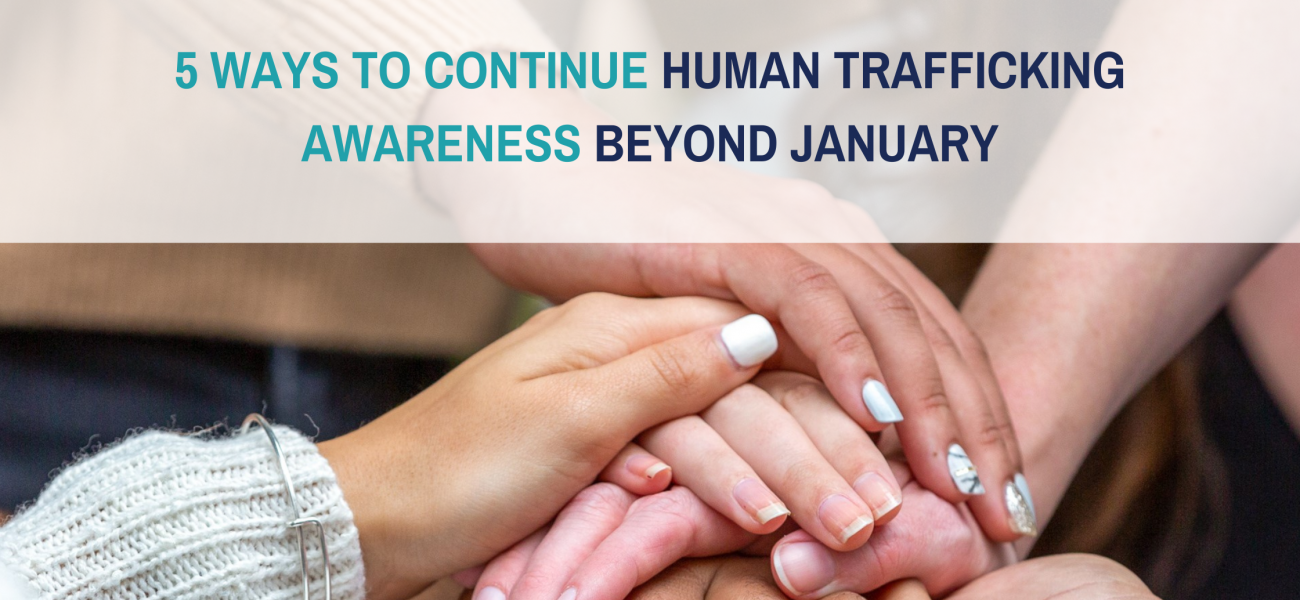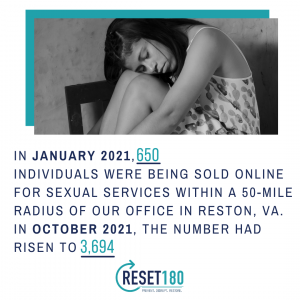20 Nov Press Release: Reset180 Applauds Fairfax County’s New Ordinance to Combat Trafficking in Massage Businesses
November 15, 2025
Press Release: Reset180 Applauds Fairfax County’s New Ordinance to Combat Trafficking in Massage Businesses


November 15, 2025


November 15, 2025


August 6, 2025
FOR IMMEDIATE RELEASE
Reston, VA – Citing growing neighborhood concern and recent criminal investigations, Reset180’s Executive Director, Esther Daniel, applauds both the community and local law enforcement for their commitment to protecting Northern Virginia from illicit massage businesses (IMBs), many of which serve as fronts for money laundering and human trafficking.
Recent Fairfax County police investigations have uncovered criminal activity at local spas, prompting charges and renewed scrutiny by authorities. The persistence and professionalism of law enforcement officials have been critical in bringing these operations to light. Equally important, residents have voiced alarm over suspicious activity near IMBs in their neighborhoods, ultimately contributing to these official inquiries and helping drive action.
Esther Daniel, Executive Director of Reset180, states:
“We deeply applaud the courage and initiative of local residents who have shared their concerns with county officials, as well as the excellent work of our law enforcement partners in investigating and pursuing justice in these cases. This combination of grassroots engagement and strong enforcement is essential, not only in exposing wrongdoing, but in demanding real accountability.”
Daniel continues:
“Illicit massage businesses do far more than skirt regulations, they undermine public safety through money laundering, and, in too many cases, serve as direct pipelines for human trafficking. The presence of these establishments erodes trust and harms the broader community.”
Reset180 urges local and state agencies to take decisive, coordinated steps to identify and close down IMBs, enforce existing statutes, and protect vulnerable residents. The organization also supports Fairfax County’s efforts to reform its massage therapy regulations, the first such update in decades, to address lapses in oversight and enforcement.
Residents can take immediate action by signing Reset180’s petition to shut down illicit massage businesses in Northern Virginia. The petition can be accessed here.
About Reset180
Reset180 is a nonprofit organization focused on disrupting human trafficking in Northern Virginia. With community-based outreach, advocacy, and survivor support, Reset180 works to dismantle illicit operations and foster restoration.
###


April 12, 2024
Nonprofit veteran Esther Daniel Joins the Executive Team
Reston, VA: On Wednesday, April 3, Esther Daniel joined Reset180 as its Executive Director, bringing to bear her 20+ years of management experience in the nonprofit’s fight to end human trafficking.
Daniel joins from International Justice Mission (IJM), where she acted as Global Director of Strategy and Execution for the last 3 of her 17 years there. She brings her anti-trafficking operation skills and her ability to spread awareness, protect victims, and rehabilitate survivors, where she will help uphold the organizations’ three pillars: Prevent, Disrupt, and Restore.
Additionally, Reset180 is confident that Daniel will lead the organization to have a greater community impact because of her nonprofit organization experience, which includes:
•Publishing over 500 articles through digital and print mediums.
•Training 40+ local NGOs, thus increasing NGO-referred cases by 38%.
•Partnering with South Asian governments and law enforcement to rescue 3k children and adults from labor trafficking over the course of 170+ rescue operations.
•Giving trauma-informed aftercare to 10k+ survivors.
•Collaborating with Indian law enforcement and government officials to develop anti-trafficking initiatives.
“I’m incredibly honored to join Reset180, an organization that has already transformed the lives of over 250 survivors through its impactful work. Together, we’ll build on this strong foundation, scale our impact, and continue to bring hope and healing to our communities,” Daniel said.
“We’re excited to have Esther Daniel lead Reset180 in our work to prevent, disrupt, and restore. With her years of experience fighting human trafficking and her servant heart, we know she will scale Reset180’s mission!” said Sherri Cooper, Reset180 Chairwoman.
Reset180 is a nonprofit that has been partnering with the Northern Virginia community since 2014. Their mission is to prevent human trafficking, disrupt the related networks, and restore the lives of those impacted.
###


March 12, 2024
Jess Bohall
If you follow the trends on human trafficking, you know that solid facts on the issue can be difficult to uncover and verify. Traffickers are constantly evolving their tradecraft as technology changes and methods become more sophisticated. In addition, conditions and characteristics that mark high prevalence areas vary based on geography. For example, methods of trafficking and who is preyed upon looks very different in Ghana than in the United States. Because awareness is a critical first tool to combating trafficking, in this post we are shedding light on some of the characteristics of human trafficking in our own communities in Fairfax County.
Several factors contribute to the prevalence of human trafficking in Fairfax County. Proximity to major transportation hubs, including Dulles and Reagan airports (both international), major interstate highways, and railways, facilitates the easy movement of traffickers and their victims. In fact, some illicit massage businesses (or IMBs) located in Herndon and Sterling will even advertise that they are a short Uber drive from Dulles.
Beyond the ease of transit, it is easy for traffickers and their victims to “disappear” into the movement of a highly populated area. Although there is a high potential of being close to trafficking in action, albeit unwittingly, the insular nature of a massive population that is constantly on the move makes it easy to hide in plain sight.
The DMV area is home to over 5.5 million people and contains vast differences in wealth distribution. Despite its overall prosperity, Fairfax County grapples with sharp economic disparities, rendering vulnerable populations more susceptible to exploitation. Where there is economic need, people can be coerced more easily into a trafficking trap.
While all types of human trafficking may exist in Fairfax County, two types that Reset180 has commonly seen are gang sex trafficking and illicit massage businesses or IMBs. Gang sex trafficking happens all over the county in Herndon, Sterling, Loudoun, Ashburn, Fairfax, Chantilly, Manassas, Tysons, Vienna, Woodbridge, and Annandale and so on. Trafficked people who are controlled by gangs are often low-income, minorities, runaways, teenagers, and transient.
It is difficult to know exactly how many IMBs exist in Fairfax County. The nature of illegal businesses harboring and involved in trafficking involves changing storefront names and locations in and out of the area frequently to avoid detection. It can also be difficult to recognize an IMB from a legitimate massage/spa business, but there are signs to be aware of. Before visiting a massage or spa locale, be sure to visit the website and look up reviews. If the website includes models in bikinis and otherwise looks similar to an adult magazine, this is a red flag that it could be an IMB. If reviews are predominantly written by men, this can be another sign of an IMB. If the workers aggressively ask for tips, it could be an indication that it is the only payment they are actually receiving. If workers live in the location of the business, this is another indication of trafficking.
Reset180 offers a variety of resources and initiatives to help prevent trafficking. We offer awareness presentations upon request at schools, businesses, churches, sororities, rotary clubs, political committees, associations, and any other groups that come to mind. Please consider requesting this for your group! We also offer awareness van tours and conduct outreach at known IMBs to ensure would-be customers know about the activity occurring there.
We also contribute to the care, support, and restoration of people caught up in trafficking schemes. This is important work that you can be involved with!
While trafficking has commonalities the world over, it also takes on some of its own characteristics depending on location. Nurturing a keen awareness of trafficking in your area helps you learn how to spot suspicious activity related to trafficking. The insular nature of many highly populated and diverse areas can also cause one to be unsure whether what they are seeing are red flags. Since we know trafficking can happen in plain sight, err on the side of caution. Reporting is the best policy even if you are not sure that what you are seeing is trafficking. Get involved and support the prevention and disruption of local human trafficking!



February 8, 2024
Jess Bohall
Have you ever heard stories about human trafficking that left you so energized to join the fight you couldn’t wait to begin? Have you realized weeks later that life happened and somehow the intention to get involved got pushed aside? If you answered yes to either of these questions, you are not alone! The month of January is Human Trafficking Prevention Month, but the fight against human trafficking doesn’t end on January 31! If you are still looking for an opportunity to engage in the fight against human trafficking, read on for helpful tips for getting involved beyond January.
The truth is that for many people the problem of human trafficking feels so big, so awful, and so hidden that we wonder what kind of difference we could even make. Sometimes it just hurts too much to think about such egregious crimes happening to vulnerable people, or the immediacy of daily life means that other tasks have crowded out our good intentions to make a difference. In fact, it is often easier to push the thought of it away instead. But here is the good news: where human trafficking depends on isolating people and ensuring compliance by preying on vulnerabilities, combatting it depends on people uniting through cooperative efforts at every level of involvement, whether big or small.
Here are five ways to get involved in the anti-human trafficking effort today:
1. Educate Yourself and Others
The more we know about trafficking, the more effectively we can combat it. Invest time in educating yourself about the different forms of trafficking, its root causes, and the tactics employed by traffickers. Talk about it within your sphere of influence. Online courses, documentaries, and reputable websites offer helpful resources such as the 2023 TIP Report and Polaris’ informational pages (start here). Locally, Reset180 can help deepen your understanding of and stay up-to-date on the evolving nature of the issue in the Northern Virginia community.
2. Support Anti-Trafficking Organizations
If you are looking for a new cause financially to support in the new year, this is an easy one! Anti-trafficking organizations play a crucial role in prevention, intervention, and survivor support. Supporting local organizations like Reset180 is a powerful way to build resilience against human trafficking within your own community. By supporting Reset180 as an Abolitionist you contribute directly to the mission. You can also volunteer your time and skills, as well as participate in fundraising events.
3. Know the Signs of Suspicious Activity and How to Report Them
Develop a keen awareness of your surroundings and be vigilant for signs of human trafficking. Be attentive to individuals who exhibit fearful behavior, restricted movement, or signs of physical abuse. Find out more about trafficking indicators here and here. If you witness suspicious activity, report it to law enforcement immediately, and contact the National Human Trafficking Hotline at 888-373-7888 to make reports confidentially.
4. Raise Awareness in Your Community
Amplifying the conversation on human trafficking is a powerful way to combat a business that relies on isolation, lies, and silence. Participate in or organize community events, workshops, or awareness campaigns to educate people about the signs and techniques of trafficking. Invite a speaker to talk to your group. The more people are aware, the more likely they are to recognize and report trafficking activities. A well-informed community is a resilient one.
5. Advocate for Stronger Legislation
Engage in advocacy efforts to strengthen anti-trafficking laws and policies. Stay informed about current legislation and be an active voice for change. Write letters, attend town hall meetings, or engage with policymakers to express the importance of robust, trauma-informed legal frameworks that protect victims and survivors and hold traffickers accountable. Circle back to your favorite anti-trafficking organizations – there are plenty of opportunities to partner in advocacy with them!
Conclusion
It is easy to feel overwhelmed or even paralyzed by the problem of human trafficking. But every action, no matter how small, contributes to the larger anti-trafficking effort. Taking the first step is often the hardest but it is the one that will lead to more involvement – and therefore greater impact. Together we can turn the tide on this humanitarian crisis.


February 1, 2022
Human trafficking victims have increased by 468.3% since January 2021
RESTON, Va., Feb. 1, 2022. New data reveals that victims of human trafficking have increased dramatically in the Northern Virginia region this past year. In January 2021, 650 individuals were being sold online in a 50-mile radius from Reston, Va. In October 2021, that number had risen to 3,694 individuals.
Freedom Signal pulled data from the past years in 2019 through 2021. In 2019, there were 19,873 individuals listed online for sexual services in a 50-mile radius of Reston, Va. In 2020, that number rose to 92,883 and in 2021 the number rose to 121,783 individuals listed online for sale for sexual services.
“These numbers are shocking and paint a picture of the ongoing need to provide outreach and restorative services to survivors,” said Kay Duffield, Executive Director of Reset180. “Reset180 continues to serve the Northern Virginia community through preventing and disrupting local human trafficking while restoring lives. We continue to need financial partners and volunteers to help us continue the important and life-changing work that we do.”
January was National Slavery and Human Trafficking Prevention Month, and as it comes to an end, Reset180 urges the community to continue raising awareness around this local, national and global issue. Reset180 exists to prevent and disrupt local human trafficking while restoring lives.

Reset180 has a trained Speakers Bureau that presents on Human Trafficking 101 at local events who educate on what local human trafficking looks like and how they can identify red flags of someone being trafficked. They have a core team of service providers and volunteers that provide and support survivors who break free of human trafficking.
Reset180 plans to build a shelter for survivors of human trafficking in 2022 – 2023 as safe shelter is the number one need of trafficked survivors locally and across the nation. Go to Reset180.com today to learn more, request a speaker to spread awareness in your community today, or partner with us to serve and support local human trafficking survivors.
Contact: ExecutiveDirector@reset180.com
SOURCE Freedom Signal



January 7, 2022
Josie*
I want you to ask yourself: Do I feel guilty saying ‘No’ to something I don’t want to do? Do I have trouble making eye-contact during a conversation? Can I ask for help when I need it and expect not to have to give anything in return? When I travel, do I lock my hotel door?
These are just a few of the things that I needed to relearn once I was out of the life. In the life, choices were made for me and the freedom to speak about what I needed wasn’t an option. So, knowing that it was okay to say ‘No’ to something that I didn’t want to do, seemed like a foreign concept and a right that I never had.
For example, I work in a hospital and I would always get asked to stay pasted my assigned hours or come in on my day off. I always said ‘Yes,’ to the point where I was exhausted. I was saying ‘Yes’ because it had been ingrained in me that saying ‘No’ would get me hurt. Now, each day, I must remind myself that I am no longer in danger and must ask, “Is this something I really want to do?” This is something I still struggle with, but that more successful times I have, the easier it becomes.

While in the life, avoiding eye-contact was a must, but in the real world you are expected to make direct eye-contact when having conversations to show that you are engaged. This was something that I was not at all use to but needed to learn rather quickly. Think about it. Try having a conversation with a person not making eye-contact with you. It is rather awkward, isn’t it? It’s a very simple but important skill to have, and one that I needed to retrain my brain to know that making eye-contact was no longer a threat to my safety.
To this day asking for help is never easy. Fresh out of the life, when help was being offered and I was not expected to do anything in return, this was something that was extremely hard for me to grasp. I had believed that nothing was given without an expectation. But through the love and support of Reset180, I quickly learned that that simply wasn’t true.

And my final question: Do you lock your hotel door? Seems like a rather silly question, right? You want to keep people from coming into your room, but I never wanted to be stuck fumbling trying to get the door unlocked if I needed to escape quickly. I would rather someone walk in the door, than not be able to get out if need be.
These are the things that still go through my mind as I try to navigate everyday life. I see the world in a different way because of my experiences. It is frustrating at times and can be a bit discouraging, but knowing where I am today compared to where I was, I will continue to do everything I need to do to never be in that place again. Even four years later, I still have a lot of bad days, a lot of days I question my worth, but the good days, the days I feel strong and the days I feel like a true survivor, are starting to outweigh the others.
In my next blog, I will be talking about the aftermath of trafficking that you don’t seem to hear too much about, the symptoms I deal with day-to-day, and what my recovery progression has been like.
Thank you so much for reading! You are an amazing person, keep being you.
*Josie
*Survivor name and photos may be changed for their protection.



January 7, 2022
Josie*
If you are reading this, you clearly are passionate about something much bigger than yourself. Something that needs to be talked about. Something that needs to be stopped.
My name is Josie and I am a survivor of human trafficking. I was both familial and pimp controlled; familial meaning trafficked by a family member and pimp controlled meaning trafficked by a pimp through force in exchange for money. I am a young adult dealing with life after being trafficked and all the struggles that come with being a survivor.

I have been free for four years and am grateful every day for this freedom, but getting to that point was a lot harder than one might think. Many assume that once you break free of the life, the hard part is over. But in reality, the hard part has only just begun.
In this blog series, I will talk about what it is like to be a survivor of human trafficking, relearning how the world is supposed to be, the symptoms I still deal with, and much more. I encourage you to follow along so you can better understand what survivors go through. I also want to point out that every survivors journey is different. This one is mine.

In my next blog, I will discuss what it was like relearning the way life is supposed to be, allowing people to help, setting healthy boundaries, and realizing that there were people out there who truly cared about me.
Thank you for taking the time to learn more about this horrific issue, and joining me as I share my story.
*Josie
*Survivor name and photos may be changed for their protection.



May 28, 2021
Kate Reilly
Though May and Mental Health Awareness month are coming to a close, the team at Reset180 encourages you to continue to learn about the signs of those struggling with mental health, how you can help others, and ways to support yourself. Mental health awareness is a subject that everyone should continue to learn about and address.
Look for the Signs
An important part of helping someone address and seek the proper care for mental health issues lies in first identifying that they need support. Consider the following list of signs that might alert you to someone in need:
If you believe someone is suffering and in need, there are ways you can make a difference!
At Reset180, we accompany human trafficking survivors on their journey to restoration both physically and mentally. Mental health awareness month may be coming to a close, but we encourage you to continue to be aware of the issues individuals may be facing and offer your support and comfort when possible.
How Reset180 Works with Survivors to Overcome Mental Health Issues and support them in achieving their Dreams:
As an organization that works with survivors of human sex trafficking, we encounter mental health struggles and trauma each day that we strive to address, understand, and support our survivors through. These issues can range from depression to anxiety to PTSD. Trauma is individualized and impacts each person differently, so each survivor requires a custom plan for services and support. Trauma has long-lasting effects and it impacts an individual’s worldview and how they access services and form relationships. Their understanding of the world is that nothing is given for free and nobody can truly be trusted because that is what the world has taught them. To overcome these traumas, Reset180 works with each survivor, developing services that build resilience and fostering empowerment and trust to create successful trauma-informed care so that survivors can one day feel safe enough to rejoin society.
Our case management team meets up to four times a month with each Reset180 survivor. During these meetings, our professionals work through self-doubt and fear to make a list of goals with the survivor. These goals can be simple or complex, but most importantly, they are achievable. Together, a case manager and survivor will map out the exact steps needed to achieve the goal they have written down. This process allows the survivor to realize the realisticness of their goal, track monthly achievements, and see the clear path to their success.
Because of gracious and compassionate donors, Reset180 is often able to cover the financial and basic needs of our survivors as they work towards their goals. It is one of the small blessings Reset180 feels grateful to be able to provide.
Consider making a donation to help support the mental health work Reset180 does, and the time and energy our staff and volunteers give to survivors on their healing journey. A donation as small as $30 a month can make a big difference in the lives of the individuals we serve.
In addition, we encourage you to sign up for our monthly newsletter to stay up to date on our events, news, and gain access to our resources.
*If you, or someone you know, is suffering from suicidal thoughts, seek assistance immediately:

